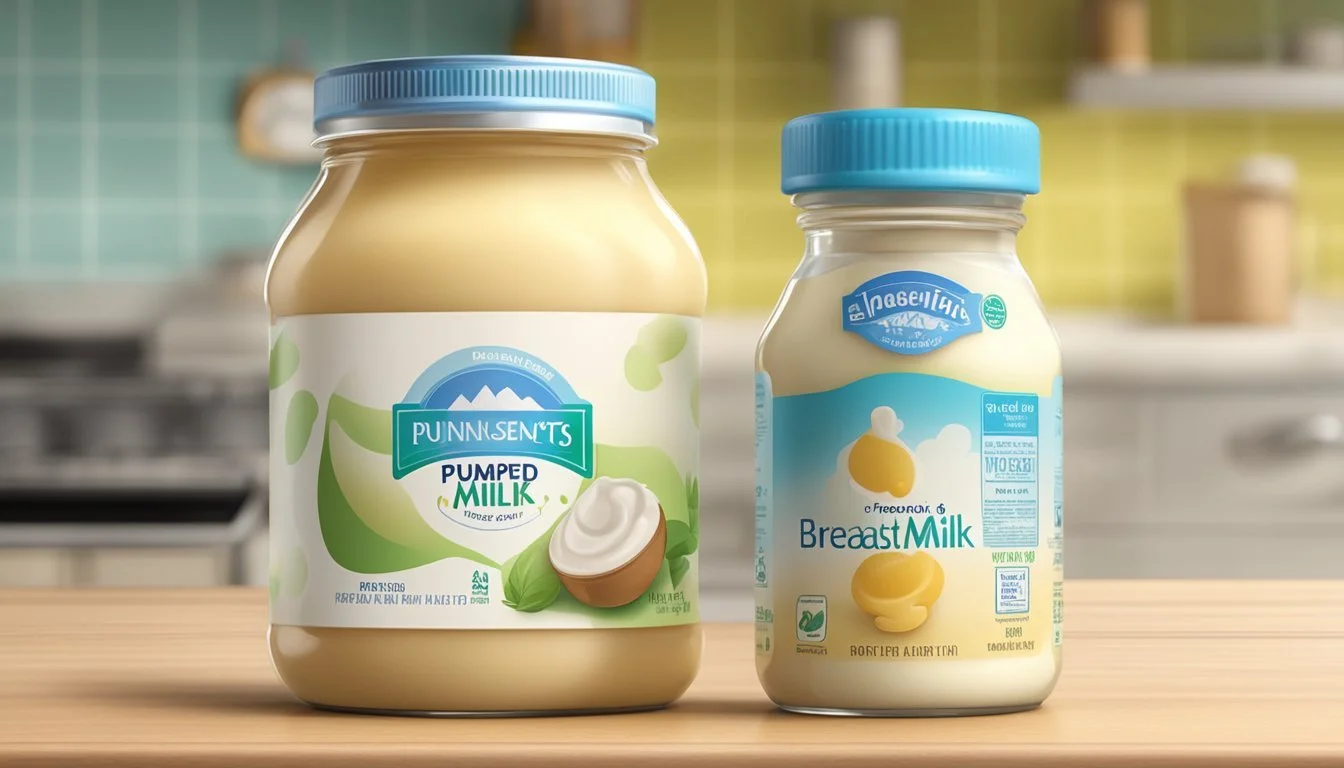Gentle Foods to Ease Constipation in Your 9-Month-Old Baby
Introducing specific foods to help a 9-month-old baby with constipation can make a significant difference in ensuring their comfort and health. By incorporating the right dietary choices, parents can alleviate common digestive issues and promote regular bowel movements.
Understanding which foods can aid in easing constipation is key to enhancing a baby's digestive health. This article explores various food options and practical tips to help parents effectively manage their baby's constipation.
1) Prune Puree
Prune puree is an effective remedy for relieving constipation in 9-month-old babies. Prunes are high in fiber and contain sorbitol, a natural sugar that helps soften stool and promote bowel movements.
To prepare prune puree, start by soaking prunes in hot water for about 10 minutes. This process helps to soften them, making them easier to blend.
After soaking, drain the prunes and place them in a blender or food processor. Puree them until smooth, adding small amounts of water if needed to achieve the desired consistency.
Prune puree can be served on its own or mixed with other baby-friendly foods like apples or pears to increase its appeal. It can be easily stored in the refrigerator for a few days or frozen for future use.
Introducing prune puree into a baby's diet should be done gradually to observe any reactions. Start with small amounts and increase as needed, ensuring that the baby gets relief from constipation.
Prune puree is a natural, gentle solution for helping babies with constipation. Its ease of preparation and effectiveness make it a popular choice among parents looking for safe options to support their baby's digestive health.
2) Pear Puree
Pear puree is a natural remedy to help relieve constipation in 9-month-old babies. It is high in fiber, which aids in bowel movements.
Pears can be easily prepared as a puree. To do this, peel and core the pears, then chop them into small pieces. Steam the pieces until they are tender.
Once the pears are tender, blend them until they reach a smooth consistency. Pear puree is gentle on a baby's digestive system.
Feeding the baby pear puree can be done once or twice a day. The taste is usually well-received by babies, making it a favorable option for parents.
Pear puree can also be mixed with other fruits or vegetables to add variety to the baby's diet. This mix can enhance the texture and nutritional value.
It's important to ensure the pears used are ripe. Ripe pears are softer and easier for the baby to digest. They also have a sweeter taste.
Avoid adding any sweeteners or seasoning to the puree. Pure pears are naturally sweet and nutritious on their own.
Always monitor the baby for any signs of allergies or digestive issues when introducing new foods.
3) Apple Sauce
Apple sauce can be a helpful food for relieving constipation in a 9-month-old. Apples contain pectin, a type of soluble fiber that aids in digestion. This fiber can help produce more regular bowel movements by adding bulk to the stool.
Apple sauce is easy for babies to consume and digest. Its soft texture makes it ideal for those who are beginning to eat more solid foods.
When preparing apple sauce for a baby, it is important to avoid adding sugar. Natural sweetness from the apples is sufficient and healthier. Plain, unsweetened apple sauce is best suited for infants.
Some prefer to cook and puree apples themselves to ensure freshness and control over the ingredients. Store-bought options are available but should be checked for added sugars and preservatives.
Adding a small serving of apple sauce to a baby's diet can aid in keeping their digestive system functioning smoothly. Pairing apple sauce with other high-fiber foods can enhance its effectiveness in promoting regular bowel movements.
4) Peach Puree
Peach puree is a beneficial option for helping a 9-month-old alleviate constipation. Peaches are rich in fiber, which can promote healthy digestion. The natural sugars in peaches can also pull water into the intestines, aiding bowel movements.
To prepare peach puree, start with fresh or frozen peaches. If using fresh peaches, peel and pit them first. Then, cook the peaches in a medium saucepan with some water for about 5-10 minutes.
Once the peaches are soft, blend them until smooth. The puree can be stored in an airtight container in the refrigerator for up to 3 days. Peach puree is not only nutritious but also gentle on a baby's digestive system, making it an ideal choice for relieving constipation.
5) Pumped Breast Milk
Pumped breast milk can help relieve constipation in a 9-month-old. Breast milk contains a natural balance of fats and proteins that can ease the baby’s digestive process.
The high water content in breast milk helps keep stools soft, making it easier for the baby to pass them. It also contains enzymes that aid digestion and improve gut health.
Breast milk is gentle on a baby's stomach and unlikely to cause constipation. If a baby has trouble with bowel movements, offering pumped breast milk between solid feedings might provide the necessary fluid and nutrients.
Pumping also allows the caregiver to gauge the baby's intake more precisely. This can help manage the consistency and frequency of bowel movements. Breast milk can be mixed with purees to add hydration.
Maintaining a healthy hydration level is critical, and breast milk ensures that the baby stays well-hydrated. The natural antibodies present can also reduce the risk of illnesses that might affect digestion.
6) Pear Juice
Pear juice can be an effective remedy for constipation in 9-month-old babies. Pears contain high levels of fiber, which helps to promote bowel movements.
Pear juice is also rich in sorbitol, a natural sugar alcohol that works as a gentle laxative. Sorbitol helps soften stools by drawing water into the intestines.
When preparing pear juice for a baby, it's best to offer it in small amounts. Start with about 2 to 4 ounces per day.
Ensure the juice is 100% pure and free from added sugars or preservatives. Diluting the juice with a bit of water can also help make it easier for the baby to digest.
Incorporating pear juice into your baby’s diet can provide relief from constipation. It’s a natural and safe option that can be easily included alongside their regular meals.
7) High-Fiber Baby Cereal
High-fiber baby cereal can be a valuable addition to a 9-month-old's diet to help alleviate constipation. These cereals are specially formulated to include significant amounts of fiber, which aids in digestion and promotes regular bowel movements.
Opt for cereals that are made from whole grains such as oats, barley, and quinoa. Avoid refined grains like rice cereal, which can contribute to constipation rather than relieve it. Whole grains retain their natural fiber content and provide a more substantial nutritional profile.
Another advantage of high-fiber baby cereals is their ease of preparation. Many come ready-to-eat or require minimal cooking, making them convenient for busy parents. Some popular options include whole-wheat cereal and oatmeal, both of which are widely available and well-tolerated by infants.
Parents can mix these cereals with breast milk, formula, or water to a consistency that suits their baby's developmental stage. Adding pureed fruits like pears or prunes can further boost the fiber content and provide additional relief.
When introducing high-fiber cereals, it's important to monitor the baby's response. Gradually increase the fiber-rich foods to prevent any digestive discomfort. This cautious approach ensures that the baby adapts well to the new dietary addition while reaping the benefits of improved digestion.
8) Warm Water
Warm water can be a simple and effective method to help a 9-month-old baby with constipation. It works by relaxing the baby's abdominal muscles, which can make it easier for them to have a bowel movement.
Giving the baby a warm bath is a practical way to utilize warm water. The warmth may help relieve any discomfort and promote bowel movements.
Ensuring the baby's hydration is another key factor. Offering small amounts of warm water to drink between regular feedings can also be beneficial. It can aid in softening the stool, making it easier to pass.
9) Oatmeal
Oatmeal is a great option for easing constipation in a 9-month-old. It's rich in soluble fiber, which helps soften the stool and makes it easier to pass. Fiber can also help bulk up the stool, promoting regular bowel movements.
This versatile food can be easily prepared and mixed with other fruits to enhance its effectiveness. Pairing oatmeal with fruits like pears or prunes can further aid in alleviating constipation.
Oatmeal is also gentle on a baby's digestive system, reducing the risk of any adverse reactions. It’s a wholesome, nutritious choice that supports overall digestive health and regularity.
To prepare oatmeal for a baby, cook it thoroughly and ensure it's a texture appropriate for their age. Avoid adding any sweeteners or additives that could upset their stomach.
Understanding Digestive Health in 9-Month-Olds
Digestive health in 9-month-olds is influenced by developmental changes in their digestive system and common issues such as constipation. Addressing these topics helps parents ensure their baby’s digestive health remains optimal.
Developmental Changes in the Digestive System
At nine months, a baby's digestive system undergoes significant changes. The introduction of solid foods shifts their diet from primarily breastmilk or formula to a mixture that includes purees and small, soft pieces of food.
Babies develop a pincer grasp, allowing them to self-feed more effectively. This skill supports the intake of varied textures, essential for digestive health. Their gastrointestinal tract also matures, increasing the efficiency of nutrient absorption and digestion.
Introducing fiber-rich foods such as pureed fruits and vegetables can aid in smoother digestion. It's crucial to offer balanced meals that supply the necessary vitamins and minerals for overall digestive system development.
Common Causes of Constipation
Constipation is a frequent issue for 9-month-olds transitioning to solid foods. Inadequate hydration can lead to harder stools, making it difficult for babies to pass them. Ensuring they drink enough fluids, including breastmilk, formula, and small amounts of water, is vital.
Diet changes, like the introduction of low-fiber foods, can also contribute to constipation. Foods such as bananas, rice cereal, and white bread could be harder to digest. Incorporating high-fiber options such as prunes, peas, and oatmeal is beneficial.
Lack of physical activity may further cause constipation. Encouraging movement through playtime can promote bowel movements and improve digestive regularity.
Dietary Considerations
Ensuring your 9-month-old stays regular often involves incorporating fiber-rich foods and maintaining proper hydration. Both elements play key roles in promoting healthy digestion and easing bowel movements.
Incorporating Fiber-Rich Foods
Fiber aids in digestion and helps bulk up stools, making them easier to pass. High-fiber foods such as plums, raspberries, and zucchini are excellent choices for your baby.
Plums and prunes are particularly effective due to their natural laxative properties. Offering small, cooked pieces or purees can be beneficial.
Vegetables like zucchini, broccoli, and carrots contribute fiber and essential nutrients. Steamed and mashed, these veggies can be easily incorporated into your baby's meals.
Whole grains like quinoa and buckwheat also add valuable fiber. Opt for whole grain breads or pastas in place of refined grains. These foods not only provide fiber but also support overall nutrition.
Proper Hydration
Hydration is crucial for softening stools and aiding digestion. Ensure your baby drinks enough fluids, which can include breast milk, formula, and small amounts of water.
Fruits with high water content, such as watermelon and pears, can help keep your baby hydrated while providing additional fiber.
Apple juice in moderation can also assist in hydration. It can pull water into the colon, softening stools and facilitating easier bowel movements.
Warm baths can help relax the abdominal muscles. This relaxation often makes it easier for your baby to pass stools.
Proper hydration and fiber intake are essential for preventing constipation and promoting bowel regularity in 9-month-olds. Maintaining a balance of the two is key for digestive health.





